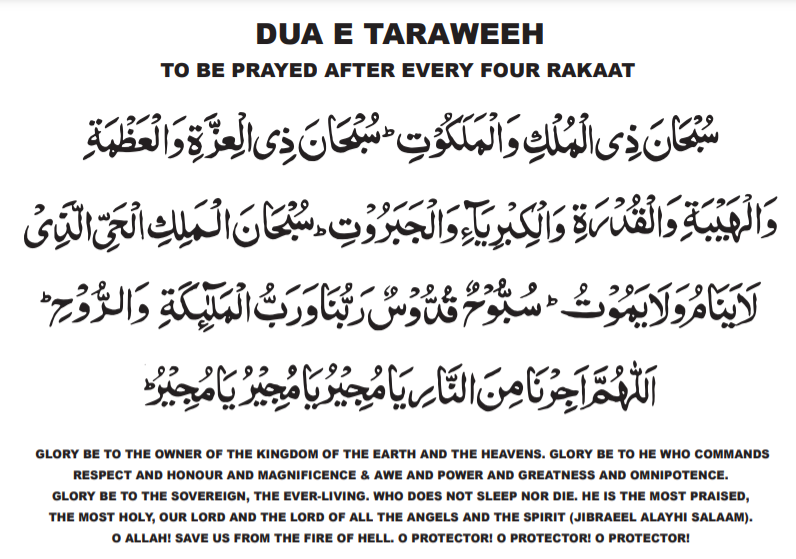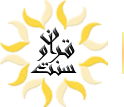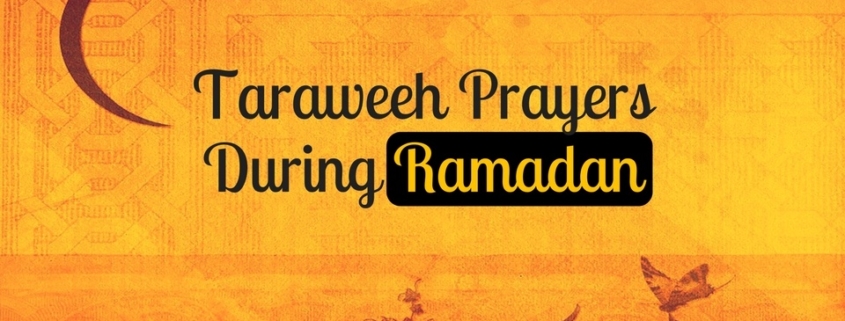Taraweeh Prayer & Its Method
What carries out Taraweeh prayer suggest?
Taraweeh petition describes added petitions performed through Muslims in the evening after the Isha prayer throughout the Holy month of Ramadan. Taraweeh arises from the Arabic phrase ‘Raahah’, which implies to take a quick rest. This refers to the short breaks they take after every four rakats. Taraweeh Prayer & Its Method
Narrated Abu Hurairah (RA): I heard Allah’s Apostle (SAW) saying regarding Ramadan, “Whoever prayed at night in it (the month of Ramadan) out of sincere Faith and hoping for a reward from Allah, then all his previous sins will be forgiven.”
(Bukhari)
Origin of Taraweeh prayer
Taraweeh is a sunnah prayer as stated by the Prophet (SAW) and means ‘rest and relax.’ This is because after every 4 rakahs, you rest for a short time. Taraweeh Prayer & Its Method
‘A’isha reported that the Messenger of Allah (ﷺ) prayed one night in the mosque and people also prayed along with him. He then prayed on the following night and there were many persons. Then on the third or fourth night (many people) gathered there, but the Messenger of Allah (ﷺ) did not come out to them (for leading the Tarawih prayer). When it was morning he said: I saw what you were doing, but I desisted to come to you (and lead the prayer) for I feared that this prayer might become obligatory for you. (He the narrator) said: It was the month of Ramadan.
Sahih Muslim
During the year 14 AH in Ramadan, Umar ibn Al-Khattab RA saw small groups of people praying behind various sahaba who were hafiz. He thought that it would be more beneficial if everyone gathered and prayed behind one imam. And He had seen Nabi SAW do this when Or He SAW was still with them, and now that the Prophet has gone from this world, there was no risk that the taraweeh prayer would be made compulsory for them.
He told Ubay Ibn Ka’b RA to lead the people and to pray 20 rakats. There are some narrations which state that they only prayed 8 rakats but the more preferred opinion and the opinion with the most narrations say that it was 20 rakats. It could have been that they had 8 to start with but due to difficulty in lengthy standings, Umar RA may have increased the number of rakats so that each rakat was shortened and the people wouldn’t have much difficulty because they didn’t have to stand for too long.
Narrations on the origins of taraweeh
Abdul aziz ibn Rufay RH says: Ubay ibn Ka’b RA would lead the people in Ramadan with 20 rakats of taraweeh, then he would finish with 3 rakats of witr.
Ibn abi Shyabah
Saa’ib ibn Yazeed RH said that the sahaba would stand in Ramadan with 20 rakats during the time of Umar RA and during the era of Uthman RA.
Bayhaqi, Sunan al Kubra
Can you pray taraweeh in the house?
Today, most individuals offer it in cathedrals in churchgoers. This is actually certainly not mandatory. Anybody can easily offer it in your home, along with his family or friends, or alone. It is all satisfactory. In congregation it gains a greater incentive. Any kind of salah supplied along with jama’ah (churchgoers) is awarded at 25-27 opportunities its typical benefit when supplied alone. Taraweeh Prayer & Its Method
In numerous countries, people prefer to possess a long petition, with the entire of the Quran recited within this petition over the month of Ramadan. This is a terrific strategy and also long might it proceed.
To wish taraweeh along with members is sunnah alal kifayah. This indicates that if there is no taraweeh wished with jama’ah in a region after that the whole region will be sinful.
How do you pray Taraweeh in the masjids and at home?
- Pray Isha (four raka’at)
- Pray two raka’at sunnah of Isha.
- Set your intention to start praying taraweeh/qiyam.
- Take a short break.
- Pray the next four raka’at (again, two raka’at at a time).
- Here, you can either end your taraweeh and move on to witr, or continue praying.
- Pray witr (either one or three raka’at).
Perks of wishing taraweeh
Taraweeh is actually sunnah muakkadah, which is the highest kind of sunnah. If you skip it without an authentic reason at that point there is transgression upon you. If you hope it at that point you receive the benefit of following a sunnah. You are going to additionally receive the perks of hoping in parish if you pray with others in the masjid. For each letter you state or even listen to of the Quran within salah, at that point you will certainly be rewarded with 10 good deeds. Currently imagine paying attention to the entire Quran. Taraweeh Prayer & Its Method
Accomplishing one Quran is actually sunnah and also completing it much more than once is actually mustahab.
The reason completing the Quran is sunnah in taraweeh is because it is something the rightly-guided companions and successors of Nabi SAW did. It comes in a hadith:
Hold onto my sunnah, and the sunnah of the rightly-guided khulafaa. Bite onto them with your molar teeth.
Ibn Majah
Another reward is that for those who have memorized the Quran, it is a perfect time for them to recap. And strengthen what they have learnt. So many of us forget everything throughout the year, then when Ramadan comes and we have to lead, we learn everything again no matter how difficult it is for us.
Taraweeh dua

How many rakat are in taraweeh prayers?
Some people pray 8 rakahs then the waajib Witr, while others pray 20 rakahs for Taraweeh then the witr prayer. Imam Maalik said it is 36 rakahs. There is a difference of opinion among the scholars regarding number. As long as it’s done in rakahs of two by two.
The more preferred opinion is praying 20 rakats. The sahaba prayed 20 and they all agreed that there was 20. So we can’t come along and say we will pray 8. If majority of the ummah says 20 then we must follow the majority.
If everyone prays 20 and someone decides to pray 8. So he leaves after 8 have been completed, then they are missing out on so much reward:
- The sunnah of praying 20 rakats
- And The sunnah of listening to the entire Quran
- Or The sunnah of praying witr with congregation in Ramadan
Hadith on taraweeh prayer
Abu Hurairah (May Allah be pleased with him) reported: The Messenger of Allah (ﷺ) used to urge (the people) to perform (optional Tarawih) prayer at night during the month of Ramadan. He did not order them or make it obligatory on them. He (ﷺ) said, “Whosoever performs (optional Tarawih) prayers at night during the month of Ramadan, with Faith and in the hope of receiving Allah’s reward, will have his past sins forgiven.”
Muslim
Abu Hurairah (May Allah be pleased with him) reported:The Messenger of Allah (ﷺ) said, “He who observes optional prayer (Tarawih prayers) throughout Ramadan, out of sincerity of Faith and in the hope of earning reward will have his past sins pardoned.”
Bukhari & Muslim
Narrated Zaid bin Thabit: Allah’s Messenger (ﷺ) made a small room (with a palm leaf mat). Allah’s Messenger (ﷺ) came out (of his house) and prayed in it. Some men came and joined him in his prayer. Then again the next night they came for the prayer, but Allah’s Messenger (ﷺ) delayed and did not come out to them. So they raised their voices and knocked the door with small stones (to draw his attention). He came out to them in a state of anger, saying, “You are still insisting (on your deed, i.e. Tarawih prayer in the mosque) that I thought that this prayer (Tarawih) might become obligatory on you. So you people, offer this prayer at your homes, for the best prayer of a person is the one which he offers at home, except the compulsory (congregational) prayer.”
Bukhari



